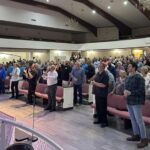SURE OF SALVATION
1 John 5:1–5, 11–13, 18–21
I can know I am born of God because Jesus is the Christ. (1–5)
There is a linear flow to this passage. First, one who believes in Jesus is born of God — the foundational tenet of the Christian faith. Second, everyone who loves God the Father will also love His other children. An assumption is built into this statement: One who is born of God will naturally love God.
It is built into human nature to love one’s father. Yes, there are exceptions, but they are caused by failures of earthly fathers or through misunderstanding. God is not capable of either. Third, the logical conclusion is that everyone who believes in Jesus will love other believers.
Fourth, love for God’s children is evidence that one loves God, but this must be combined with obedience to His commands. The proof of love for God is in loving believers and living in obedience.
John is careful to avoid the idea that obedience means an ascetic lifestyle (Col. 2:16–23). God’s commandments do not burden. Instead, they give freedom to the extent of helping us overcome the burdens of the world.
I can know I have eternal life because God’s Word says so. (11–13)
Another foundational tenet of Christianity is the inerrancy of God’s Word. John wrote his gospel to help people “believe that Jesus is the Messiah, the Son of God … ” (John 20:31). John wrote his letters to people who already believed in Jesus to give them assurance; many false teachers were presenting confusing ideas about Him. John wanted to remind believers that salvation was simply believing in Jesus. Again, loving His people and obeying His commandments are evidence of salvation, not causes. John made this clear with the phrase “so that.” When “so that” appears in Scripture, it usually introduces a “purpose clause.” To a first century reader, John was stating, “My purpose in writing is … .”
As an eyewitness to the earthly ministry of Jesus, John can say, “This is my testimony. I saw it. I’m telling you. Now you know it too.”
I can know I am saved because my life has changed. (18–21)
John closes his letter with three things “we know.” First, one who is born of God does not continue in sin. “Continue” is not translated in the Christian Standard Bible, but the idea is present in both the Greek syntax and in context — the verb tense of “sin” often is used for a continuing activity. John also has allowed in the preceding verses that Christians can commit sinful acts when he writes, “If anyone sees a fellow believer committing a sin … ” (v. 16). Though believers still have a sin nature, the presence of Jesus (being “in” Jesus) gives the believer power to refuse sin (1 Cor. 10:13). How can one know they belong to Jesus? They have overcome the power of continual sin.
John presents an unavoidable dichotomy with his second “we know.” We know this world is divided into two groups: The majority (not just humans, but all reality) is under the control of the evil one. Yet there are a few who are not, and that includes John’s readers and all believers.
How did believers manage to escape the evil influence that controls the world? This is John’s third “we know.” We know that Jesus, the Son of God, has come to give believers eternal life — because He is eternal life.
By Daryl Watts
Watts is a church consultant in Fresno, California.




